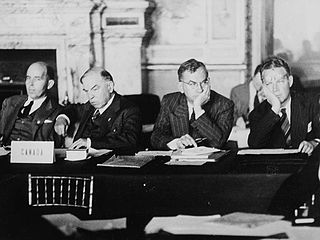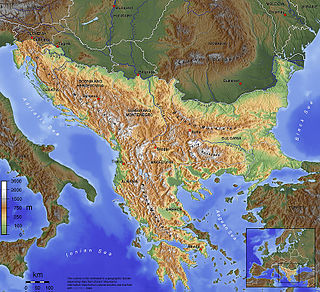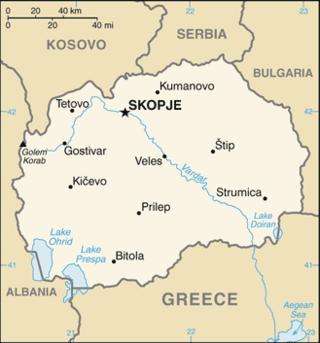
The member states of the United Nations comprise 193 sovereign states. The United Nations (UN) is the world's largest intergovernmental organization. All members have equal representation in the UN General Assembly.

The United Nations Interim Administration Mission in Kosovo is the officially mandated mission of the United Nations in Kosovo. The UNMIK describes its mandate as being to "help the United Nations Security Council achieve an overall objective, namely, to ensure conditions for a peaceful and normal life for all inhabitants of Kosovo and advance regional stability in the Western Balkans."

The Paris Peace Treaties were signed on 10 February 1947 following the end of World War II in 1945. The Paris Peace Conference lasted from 29 July until 15 October 1946. The victorious wartime Allied powers negotiated the details of peace treaties with those former Axis allies, namely Italy, Romania, Hungary, Bulgaria, and Finland, which had switched sides and declared war on Germany during the war. They were allowed to fully resume their responsibilities as sovereign states in international affairs and to qualify for membership in the United Nations. Nevertheless, the Paris Peace Treaties avoided taking into consideration the consequences of the Molotov–Ribbentrop Pact, officially known as the Treaty of Non-Aggression between Germany and the Union of Soviet Socialist Republics, whose secret clauses included the division of Poland between Nazi Germany and the Soviet Union, the occupation of the Baltic States, and the annexation of parts of Finland and Romania. The Molotov–Ribbentrop Pact changed the borders agreed after the Paris Peace Conference (1919–1920), and was signed on August 23, 1939. One week later, World War II started with Nazi Germany's invasion of Poland, followed three weeks later by the Soviet invasion of Poland, which was completely erased from the map. In the following years, Nazi Germany and the Soviet Union changed the borders established by the peace treaties at the end of World War I.

United Nations Security Council resolution 1244, adopted on 10 June 1999, after recalling resolutions 1160 (1998), 1199 (1998), 1203 (1998) and 1239 (1999), authorised an international civil and military presence in the Federal Republic of Yugoslavia and established the United Nations Interim Administration Mission in Kosovo (UNMIK). It followed an agreement by Yugoslav President Slobodan Milošević to terms proposed by President of Finland Martti Ahtisaari and former Prime Minister of Russia Viktor Chernomyrdin on 8 June, involving withdrawal of all Yugoslav state forces from Kosovo.
The political status of Kosovo, also known as the Kosovo question, is the subject of a long-running political and territorial dispute between the Serbian government and the Government of Kosovo, stemming from the breakup of Yugoslavia (1991–92) and the ensuing Kosovo War (1998–99). In 1999, the administration of the Autonomous Province of Kosovo and Metohija was handed on an interim basis to the United Nations under the terms of UNSCR 1244 which ended the Kosovo conflict of that year. That resolution reaffirmed the territorial integrity of Serbia over Kosovo but required the UN administration to promote the establishment of 'substantial autonomy and self-government' for Kosovo pending a 'final settlement' for negotiation between the parties.

United Nations Security Council Resolution 12 was adopted on 10 December 1946. The Council invited Greece and Yugoslavia to participate in discussions surrounding allegations of British troops interfering in Greece's internal affairs. Albania and Bulgaria were invited to present declarations before the Council.

United Nations Security Council Resolution 15 was adopted unanimously on 19 December 19 1946. The Council established a commission of investigation into the alleged border violations between Greece and Albania, Bulgaria, and Yugoslavia.

United Nations Security Council Resolution 17 was adopted on 10 February 1947. The Council declared that the commission established by Resolution 15 did not have the authority to request the governments of Greece, Albania, Bulgaria, or Yugoslavia to postpone any executions of political prisoners unless the commission believed they could provide testimony helpful to its work.

United Nations Security Council Resolution 23 was adopted on 18 April 1947. The Council established a subsidiary group to assist the commission investigating the alleged border violations between Greece and Albania, Bulgaria, and Yugoslavia formed by Resolution 15.

United Nations Security Council Resolution 34, titled "The Greek Question" and adopted on 15 September 1947, removed disputes between Greece and Albania, Yugoslavia and Bulgaria from the Council's agenda. It further requested the Secretary-General to place all records and documents in the case at the disposal of the General Assembly.
United Nations Security Council resolution 1105, adopted unanimously on 9 April 1997, after recalling Resolution 1082 (1996), the Council decided to suspend reduction of the military component of the United Nations Preventive Deployment Force (UNPREDEP) in Macedonia until the end of its current mandate, until 31 May 1997.

United Nations Security Council resolution 1110, adopted unanimously on 28 May 1997, after recalling resolutions 1082 (1996) and 1105 (1997), the Council renewed the mandate of the United Nations Preventive Deployment Force (UNPREDEP) in Macedonia until 30 November 1997.

United Nations Security Council resolution 1142, adopted unanimously on 4 December 1997, after recalling resolutions 1105 (1997) and 1110 (1997), the Council extended the mandate of the United Nations Preventive Deployment Force (UNPREDEP) in Macedonia until 31 August 1998.

United Nations Security Council resolution 1160, adopted on 31 March 1998, after noting the situation in Kosovo, the council, acting under Chapter VII of the United Nations Charter, imposed an arms embargo and economic sanctions on the Federal Republic of Yugoslavia, hoping to end the use of excessive force by the government.

United Nations Security Council resolution 1186, adopted unanimously on 21 July 1998, after recalling resolutions 1105 (1997) and 1110 (1997), the Council extended and strengthened the mandate of the United Nations Preventive Deployment Force (UNPREDEP) in Macedonia until 28 February 1999.

United Nations Security Council resolution 1199, adopted on 23 September 1998, after recalling Resolution 1160 (1998), the Council demanded that the Albanian and Yugoslav parties in Kosovo end hostilities and observe a ceasefire.

United Nations Security Council resolution 1203, adopted on 24 October 1998, after recalling resolutions 1160 (1998) and 1199 (1998) on Kosovo, the Council demanded that the Federal Republic of Yugoslavia comply with previous Security Council resolutions and co-operate with the NATO and Organization for Security and Co-operation in Europe (OSCE) verification missions in Kosovo.

United Nations Security Council resolution 1239, adopted on 14 May 1999, after recalling resolutions 1160 (1998), 1199 (1998) and 1203 (1998), the Council called for access for the United Nations and other humanitarian personnel operating in Kosovo to other parts of the Federal Republic of Yugoslavia.

United Nations Security Council resolution 1345, adopted unanimously on 21 March 2001, after reaffirming resolutions 1160 (1998), 1199 (1998), 1203 (2000), 1239 (1999) and 1244 (1999) on the situation in the former Yugoslavia, the council condemned extremist violence and terrorist activities in parts of Macedonia and southern Serbia and called upon Kosovo Albanian leaders to condemn the violence.

Democratic Federal Yugoslavia was a charter member of the United Nations from its establishment in 1945 as the Socialist Federal Republic of Yugoslavia until 1992 during the Yugoslav Wars. During its existence the country played a prominent role in the promotion of multilateralism and narrowing of the Cold War divisions in which various UN bodies were perceived as important vehicles. Yugoslavia was elected a non-permanent member of the United Nations Security Council on multiple occasions in periods between 1950 and 1951, 1956, 1972–1973, and 1988–1989, which was in total 7 years of Yugoslav membership in the organization. The country was also one of 17 original members of the Special Committee on Decolonization.

















